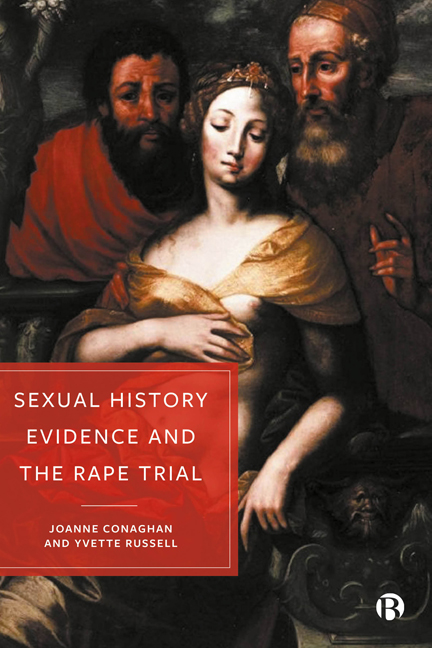Book contents
- Frontmatter
- Contents
- List of Cases
- List of Statutes
- About the Authors
- Acknowledgements
- 1 Introduction: Setting the Scene
- 2 A History of Rape Law in Action
- 3 Emergence of a Legal Regime Governing the Use of Sexual History Evidence
- 4 Legal Regulation: Limits and Potentialities
- 5 Tracking the Use of Sexual History Evidence in the Courtroom
- 6 The Relevance of Sexual History Evidence
- 7 Sexual History Evidence and Subjectivity
- 8 Conclusion: What Is to Be Done about Sexual History Evidence?
- References
- Index
6 - The Relevance of Sexual History Evidence
Published online by Cambridge University Press: 03 April 2024
- Frontmatter
- Contents
- List of Cases
- List of Statutes
- About the Authors
- Acknowledgements
- 1 Introduction: Setting the Scene
- 2 A History of Rape Law in Action
- 3 Emergence of a Legal Regime Governing the Use of Sexual History Evidence
- 4 Legal Regulation: Limits and Potentialities
- 5 Tracking the Use of Sexual History Evidence in the Courtroom
- 6 The Relevance of Sexual History Evidence
- 7 Sexual History Evidence and Subjectivity
- 8 Conclusion: What Is to Be Done about Sexual History Evidence?
- References
- Index
Summary
Introduction: the ‘logic’ of relevance
How do we know when a complainant’s sexual history is relevant to the question of whether she was raped? The legal consensus is to view this is as a matter of logic and common sense. These are the concepts to which judges appeal when assessing claims of evidentiary relevance. They also surface repeatedly in legislative and policy debate. Logic and common sense are seen here as pathways to objectivity and truth. We know sexual history evidence is relevant when it helps to establish, objectively, what has occurred; when it has a material bearing upon the truth or falsity of what is alleged.
How though do we know that the evidence bears truthfully upon the facts? What intellectual processes prompt us to connect one factual claim, for example that the complainant consented to sex with the defendant on a previous occasion, with another, that is, that the complainant consented to sex with the defendant on the occasion forming the subject matter of the charge? This is precisely what the concept of relevance enables us to do, to connect disparate facts so that one has probative potency in relation to another. In his classic textbook, Law of Evidence, Ian Dennis (2020) breaks down the moves entailed in establishing relevance to reveal their logical base. At the heart of most relevance claims, he explains, is a form of deductive reasoning, whereby the truth of a proposition depends on applying a major premise (‘all men are mortal’), to a minor premise (‘Socrates is a man’) to deduce a conclusion (‘Socrates is mortal’). The minor premise and the conclusion are the ‘facts’ to be connected; the major premise provides the basis for connecting them. Determinations of relevance, Dennis explains, generally take this syllogistic form (2020: 3–003).
Of critical importance here is the role played by the major premise. Without the major premise, the minor premise and the conclusion are simply random, unconnected facts. From where do we get the major premise, and how do we know it is sound? This is where ‘common sense’ comes into play. The major premise is drawn from general experience, it is part of ‘our common stock of knowledge about the world’ (Dennis, 2020: 3–002).
- Type
- Chapter
- Information
- Sexual History Evidence and the Rape Trial , pp. 129 - 160Publisher: Bristol University PressPrint publication year: 2023

